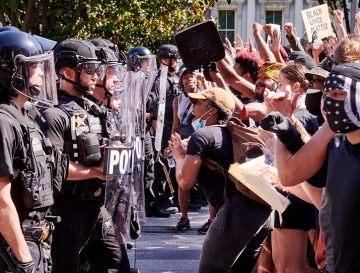Rafia Zakaria in The Baffler:
 ALONE AND INSIDE IN THESE first weeks of summer, I monitor the riot within myself. As one of the infirm, the immunocompromised, the quarantine and lockdown have not ended for me. When people first began to emerge from their homes, cautious, sleepy-eyed, and then bold and rambunctious, I did not feel envious of them. They were courting the virus as they cavorted in parks or guzzled down drinks from sweaty bottles on the patios of bars and taverns. I was happy in my refuge, surrounded by books and occupied with writing. I felt dread for them, for the vigor they felt they had earned by capitulating to a long sentence of solitude. I was still serving the sentence, but contentedly, with a circumspection that was surprising even to myself.
ALONE AND INSIDE IN THESE first weeks of summer, I monitor the riot within myself. As one of the infirm, the immunocompromised, the quarantine and lockdown have not ended for me. When people first began to emerge from their homes, cautious, sleepy-eyed, and then bold and rambunctious, I did not feel envious of them. They were courting the virus as they cavorted in parks or guzzled down drinks from sweaty bottles on the patios of bars and taverns. I was happy in my refuge, surrounded by books and occupied with writing. I felt dread for them, for the vigor they felt they had earned by capitulating to a long sentence of solitude. I was still serving the sentence, but contentedly, with a circumspection that was surprising even to myself.
George Floyd’s death and the ensuing protests that have erupted all over the country, even the world, have changed that. We have watched the tableaux of torture that was Floyd’s death, the policeman-murderer a wolfish Grendel for our age, his “brutal, blood-caked claw” invisible yet omnipresent. His pack ensured that he would get his kill, and we saw them too, watching, ensuring that the morbid hunt would get its sordid public finale.
Everyone else—much like the polity brutalized by Grendel, that beast of old epics—cannot but gasp at what they have seen, what they know, and what course such knowledge entails. This is the moral burden of watching George Floyd’s death at the hands of the Minneapolis police. There is not one answer; the bravest and the youngest have taken to the streets, where they march, and sit, and lay prone, and march again, some forced to mourn the sudden death of their own American fantasy. In the heat, amid the asphalt, rubber bullets are aimed at their flesh, gases wring tears from their eyes; their paltry rags and masks cannot match the careful technologies of harm inflicted by guns and grenades.
More here.
